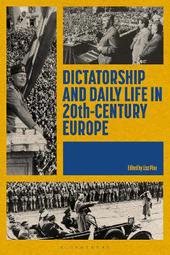
|
Dictatorship and Daily Life in 20th-Century Europe
Paperback / softback
Main Details
| Title |
Dictatorship and Daily Life in 20th-Century Europe
|
| Authors and Contributors |
Edited by Dr. Lisa Pine
|
| Physical Properties |
| Format:Paperback / softback | | Pages:280 | | Dimensions(mm): Height 234,Width 156 |
|
| ISBN/Barcode |
9781350208988
|
| Classifications | Dewey:321.9094 |
|---|
| Audience | | Tertiary Education (US: College) | |
|---|
| Illustrations |
16 bw illus
|
|
Publishing Details |
| Publisher |
Bloomsbury Publishing PLC
|
| Imprint |
Bloomsbury Academic
|
| Publication Date |
1 December 2022 |
| Publication Country |
United Kingdom
|
Description
Bringing together leading scholars from across the UK, North America and mainland Europe, this book provides a uniquely comparative exploration of daily life under dictatorship in 20th-century Europe. With coverage of well-known regimes and some that are relatively underrepresented in the literature from right across the continent, it examines the impact felt on people's lives amidst political administrations characterised by some or all of the following: a one-party state, in which opposition or multiple parties were banned; a cult surrounding the leader; the censorship of the press and other publications; the widespread use of propaganda and political persuasion; and the threat or use of force by the regime and its agents. The chapters investigate crucial questions in relation to life under dictatorships as follows: * What was the impact of censorship on access to news or entertainment? * How was leisure time conducted? * What was the impact of the regime on working life? * What was the scope for dissent and resistance? To what extent were these possible? * How much did the regime coerce the population and how much did it try to indoctrinate? * What was the difference for Party leaders, comrades and members in terms of the possibilities and opportunities that opened up, compared to everyone else in society? * With the shutting down - to a large extent - of civil society and state intrusion into private life, what restrictions were placed on ordinary and day-to-day activities? * What happened to religious life and to cultural life and the arts? * How were personal choices in aspects of life such as reproduction, education and even eating affected by these regimes? * What was the impact of different political ideologies on people's way of life - whether Fascist, Nazi or Communist? Dictatorship and Daily Life in 20th-Century Europe addresses these issues and more, striking to the heart of European life in the darkest episodes of its recent history.
Author Biography
Lisa Pine is Associate Fellow of the Institute of Historical Research, University of London, UK. She is the author of Nazi Family Policy, 1933-1945 (1997), Hitler's "National Community": Society and Culture in Nazi Germany (2007, 2017), Education in Nazi Germany (2010) and Debating Genocide (2018). She is the editor of Life and Times in Nazi Germany (2016) and The Family in Modern Germany (2020).
ReviewsLisa Pine's latest edited volume will prove to be invaluable for scholars and students interested in the history of everyday life in dictatorships in Western and Eastern Europe. The transnational, comparative approach illuminates the diverse responses of ordinary citizens to these regimes, and the ways in which individuals conformed to, accommodated or evaded state control. With nuanced analysis of daily life in diverse societies, the chapters in this cohesive volume offer an extraordinary glimpse into the social and cultural history of coercion, consent, and dissent in some of the most violent regimes of the twentieth century. * Jason Crouthamel, Professor of History, Grand Valley State University, USA * This is an important book. Lisa Pine has assembled a fine team of historians to recreate the ebb and flow of daily life in such dictatorships as Hitler's Germany, Stalin's Soviet Union, Salazar's Portugal, or Ceausescu's Romania. Packed with fascinating material and drawing on a wide array of sources, the chapters included here demonstrate how ordinary people built love-hate relationships with authoritarian and totalitarian regimes, both at the left and the right of the political spectrum, which kept them under strict surveillance and constantly deprived them of many personal and collective rights. This is an essential reading for all those interested in the history and politics of twentieth-century Europe. * Marius Turda, Professor, Oxford Brookes University, UK * Wide rangeing and ably constructed, this important collection provides multiple insights not only on the character of dictatorships, but also on social change in twentieth century Europe. The inclusion of Communism and Fascism invites readers to important comparisons. As Lisa Pine notes in her helpful conclusion, key elements included the length of the regime. * ?Jeremy Black, author of A History of Germany *
|